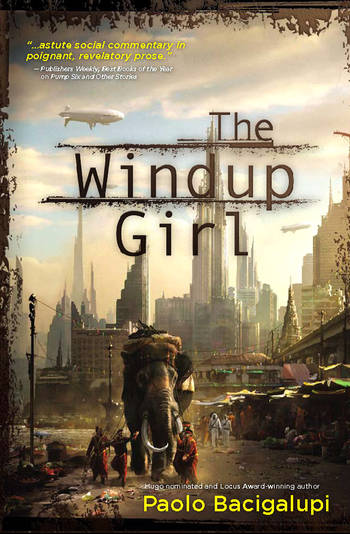by Paolo Bacigalupi
“A man with dragon tattoos on his stomach and a takraw ball tattooes on his shoulder gawks at her as she walks past. ‘Heechy-keechy,’ he murmurs.
Emiko doesn’t slow, doesn’t turn at the words, but her skin prickles.
The man follows her. ‘heechy-keechy,’ he says again.
She glances back. His face is unfriendly. He’s missing a hand as well, she’s horrified to notice. he reaches out with the stump and prods her shoulder. She jerks away, stutter-stop reaction, betraying her nature. He smiles, and his teeth are black with betel nut.” (p. 152-3).
Paolo Bacigalupi (pronounced BATCH-i-ga-LOOP-ee) has produced an epic first novel that leaves readers begging for more. He is definitely an author to keep an eye on and I am keen to see what he turns out next. The Windup Girl brings to life a world that is completely foreign, not only placed well into the future where calorie companies control the world, oil has run out and New People, beings that are created to serve in their “heechy-keechy” movements, are used and abused like objects, but Bacigalupi uses multiple cultures such as Japanese and Thai to distant the reader even more from this dystopian, yet chillingly potential, future.
With a novel of this complexity, it is not surprising that I found that it took a little to fully immerse myself in the story with multiple character points of view and the switching of places and narratives that went along with it; however, I loved how this technique allowed for a fuller perspective of the characters as they judged and viewed each other as the novel progresses. Each character presents a different viewpoint.
The first is the AgriGen’s calorie representative Anderson Lake who takes on the role of a farang, a foreigner who seeks information that can save the world from blister rust and cibiscosis as genetically modified food stuffs mutate, but most importantly seeks to make a profit no matter who gets in his way.
The next is a yellow card, Hock Seng. An ex-businessman of unimaginable wealth, he is the only survivor of his clan and seeks refuge in a society that see him as useless, struggling to gain back the power he once held.
We are introduced next to Emiko, a Japanese windup that was abandoned and forced into prostitution to keep her poorly equipped body cool in the tropical heat and from being mulched by those that see her as unnatural.
Jaidee Rojjanasukchai is the”incorruptible Tiger of Bangkok,” the face of the white shirts who takes on the big fish Trade in his efforts to keep contraband out of his country whilst not saying no to bribery. His second in command is Kanya, a woman who never smiles with a tragic history that owns her. These characters help define the biggest character of them all. The world they inhabit.
As you read, you can feel the heat scorching across their skin, sweat slick against their necks and the thick humidity that smothers everything. You can smell the incense that Hock Seng burns, the steaming bowls of noodles in the streets, the smell of smoke and tanks and the sweet, strong smell of jasmine blossoms. The details are exact and colourful, filling in every street corner with sound, movement and taste yet the plot does not get bogged down by the particulars. This futuristic world offers us a glimpse of what can happen with the threat of global warming, the advancement of technology in both genetically modified products and mass-production of throw-away materialistic objects resulting in a fragmented and somewhat hopeless world. The characters struggle within themselves to survive and not all of them are successful.
Bacigalupi, Paolo. The Windup Girl. Orbit, London. 2011. ISBN 978-0-356-50053-9

